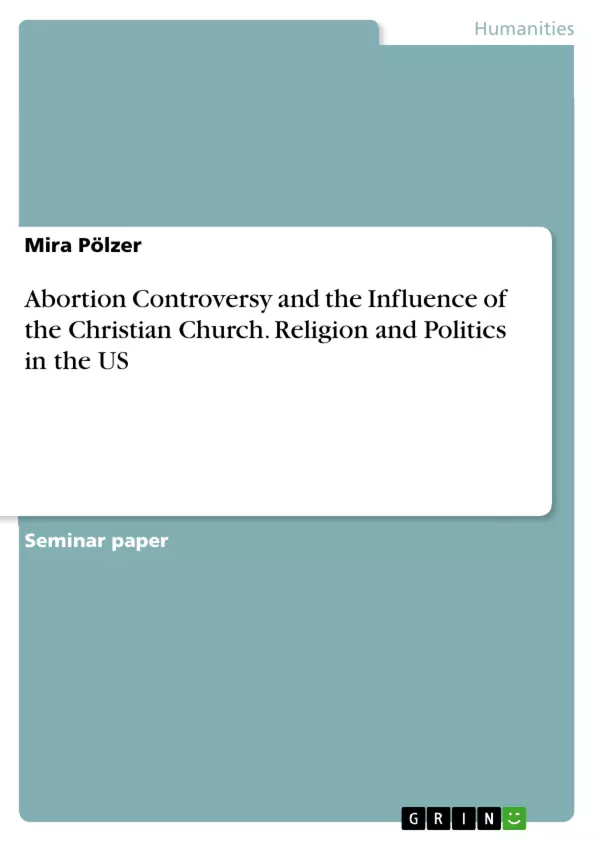This paper discusses the abortion controversy in the United States. It analyses the influence of the Christian Church on the debate whether abortion should be legal or illegal. This question is especially interesting because, even though the constitution requires a separation of church and state, the US government was in its origin partially defined by Christian values. Furthermore, while in other Western countries the importance of religion is declining, the United States is still a very devout country.
The discussion, whether abortion should be legal or not, is a never-ending topic all over the world. In America, it has been debated for decades. In presidential campaigns, it is always addressed, but never as much as in the 2020 race with the possible re-election of Donald Trump. Especially concerning the new seat in the supreme court, which was highly disputed.
Recently it was confirmed that the conservative judge Amy Coney Barrett will replace Ginsburg. This could mean that the judiciary branch of the federal government would develop to be more conservative. This could maybe even result in a re-discussion of Roe versus Wade. This would not only affect abortion policies strongly but moreover would be a huge occurrence for American Politics in general.
Even though the majority of the American population is positioned in the middle of both political positions, the extreme opinions of Pro-life and Pro-choice have dominated the discussion. Some people are even so involved or even obsessed (some even feel offended in their religious belief) that protests or smaller gatherings in front of abortion clinics are not uncommon. While Pro-choice believes in the option to decide, Pro-life thinks abortion is murder.
In general, pro-life tends to be the more conservative view on that topic as it is developing out of the traditional biblical opinion. In the past this had a clear influence on the political decisions concerning the abortion policies. The reason for this is, as we will see, the connection between the strictly believing evangelists and the republicans. How strong was the influence the Church took in this political debate if abortion should be legal or not?
Inhaltsverzeichnis (Table of Contents)
- Introduction
- Place of religion in US politics
- Abortion in the US
- Pro-Life vs. Pro-Choice
- Church and Abortion
Zielsetzung und Themenschwerpunkte (Objectives and Key Themes)
This paper examines the influence of the Christian Church on abortion policies in the United States. It investigates the historical and contemporary role of religion in American politics, focusing on the controversial debate between Pro-life and Pro-choice viewpoints. The paper aims to analyze the relationship between church and state in this specific context, exploring the impact of Christian values on legislative decisions regarding abortion.
- The historical and contemporary role of religion in American politics
- The influence of Christian values on abortion policies
- The relationship between church and state in the United States
- The Pro-life and Pro-choice perspectives on abortion
- The impact of the Christian Church on American political debates
Zusammenfassung der Kapitel (Chapter Summaries)
The introduction sets the stage for the paper, introducing the ongoing abortion debate in the United States and highlighting the historical and contemporary significance of the issue. The chapter emphasizes the potential impact of the Supreme Court's composition on abortion policies and provides an overview of the Pro-life and Pro-choice viewpoints.
The second chapter delves into the historical context of the relationship between religion and US politics, exploring the influence of the Christian Church on lawmaking. It discusses the separation of church and state principle enshrined in the First Amendment, while acknowledging the significant role of religion in shaping American values.
The third chapter focuses on the abortion debate in the United States, exploring the arguments and motivations behind the Pro-life and Pro-choice positions. It examines the historical evolution of abortion laws and the influence of religious beliefs on public opinion and policy decisions.
The fourth chapter delves deeper into the role of the Christian Church in the abortion debate. It analyzes the connection between the church's moral teachings and the political stances taken by various Christian denominations. The chapter examines the influence of religious leaders and organizations on public discourse and legislative efforts regarding abortion.
Schlüsselwörter (Keywords)
This paper focuses on the intersection of religion, politics, and abortion in the United States. Key terms include: abortion policy, Christian Church, separation of church and state, Pro-life, Pro-choice, religious influence, political debate, and legislative decision-making. The paper investigates the historical and contemporary relationship between religion and American politics, exploring the impact of Christian values on policy decisions regarding abortion.
Frequently Asked Questions
How does religion influence the abortion debate in the US?
The Christian Church, particularly evangelical groups, significantly influences policy through moral teachings and strong ties to conservative political parties, shaping the Pro-life movement's stance that abortion is murder.
What is the difference between Pro-life and Pro-choice?
Pro-life supporters believe abortion is murder and advocate for its illegality based on traditional or biblical values. Pro-choice supporters advocate for an individual's right to choose and decide over their own body.
Is there a separation of church and state in the United States?
Yes, the US Constitution and the First Amendment require a separation of church and state. However, the government was historically influenced by Christian values, and religion remains a powerful force in modern American politics.
Why was the appointment of Amy Coney Barrett significant for abortion laws?
As a conservative judge, her appointment shifted the Supreme Court's balance, leading to discussions about re-evaluating major precedents like Roe v. Wade and potentially changing national abortion policies.
How do religious beliefs manifest in public protests regarding abortion?
Many individuals feel their religious beliefs are offended by abortion, leading to frequent protests and gatherings in front of abortion clinics as a form of political and moral activism.
- Quote paper
- Mira Pölzer (Author), 2020, Abortion Controversy and the Influence of the Christian Church. Religion and Politics in the US, Munich, GRIN Verlag, https://www.grin.com/document/1006674



